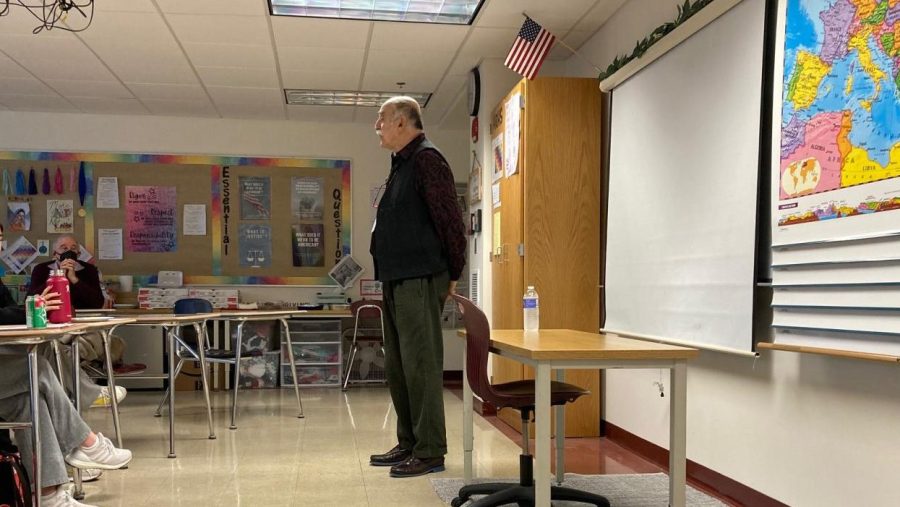Holocaust survivor Jack Trompetter speaks to Holocaust and Human Behavior class
Holocaust survivor Jack Trompetter spoke to students enrolled in the Holocaust and Human Behavior class.
January 25, 2023
Holocaust survivor Jack Trompetter shared his unique experiences with students enrolled in the Holocaust and Human Behavior class, and he stressed the importance of making mindful decisions.
Trompetter was born in Amsterdam, Netherlands in 1942, when antisemitism in Europe was intensifying. Trompetter’s parents made the decision to go into hiding and give him up to a Christian family in order to increase his chance at survival. Trompetter is dedicated to sharing his story and educating others on the Holocaust.
Among the audience members was Principal Sean Bevan.
“[Trompetter] created a personalized experience of the Holocaust in a way that you don’t get from videos or even a movie depiction,” Bevan said.
Trompetter’s ability to share his story in an moving and engaging manner left the students and teachers in attendance with a long lasting experience.
“I was really moved by his good humor,” Bevan said. “I think he indicated that it took a lot of therapy to get there and be able to do things like these speaking engagements where he talks about how horrific that experience was but how much joy he achieved in the rest of his life.”
Social Studies Department Head Brittany Burns teaches Holocaust and Human Behavior and has been hosting Trompetter since 2013.
“One of the things I love about [Trompetter] is that he is not afraid to talk about anything,” Burns said.
One aspect of Trompetter’s story that particularly impacted Burns is the work he has done to understand the complexities of his parents’ decision. Through conversations with his mother, taking place throughout his teenage years, Trompetter began to learn his story and understand why his parents made the decision to give him up.
“[Trompetter] really does think a lot about the trauma this was for his parents and how hard it can be to make decisions,” Burns said.
Trompetter discussed the struggles he faced when separated and reunited with his parents, and how sharing his experience has helped him cope.
“[Trompetter] really reminds me that we have to talk about these things in order to live them and experience them and to work together as a society to figure them out,” Burns said. “On a personal level, that is one thing that I really respect and appreciate about him.”
Trompetter was a child during the Holocaust, so his experiences left a lifelong impact on him.
“Even children, no matter how small the story is, are still important to learn about no matter what,” Holocaust and Human Behavior student senior Caden Tennyson said.
Over the years, Burns has observed the evolution of Trompetter’s storytelling and is glad her students are able to benefit from the personal experiences he shares with them. Trompetter reminded his audience of the importance of making thoughtful decisions,as they can lead to profound impacts.
“If we spend more time thinking both about the choices we make but also why other people make decisions, I think we could be a lot more empathetic,” Burns said.











Klapwijk Arie • Jan 28, 2024 at 6:25 am
We have pictures off Jack en Andy at the time off there hiding in Heino.
One he was 3 years old en one with Andy he was 5 years old.
Do you a mail adres of Jack Trompetter?